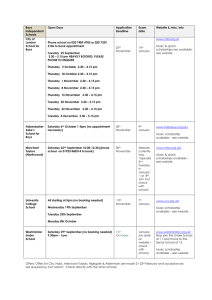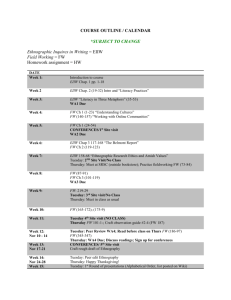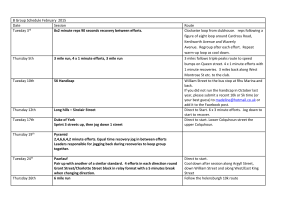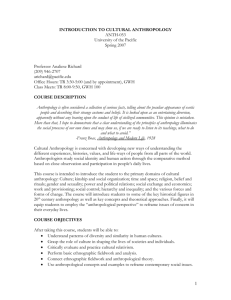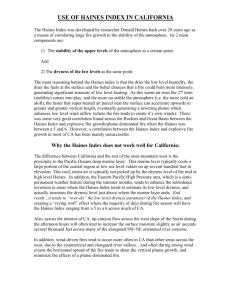introduction to cultural anthropology
advertisement
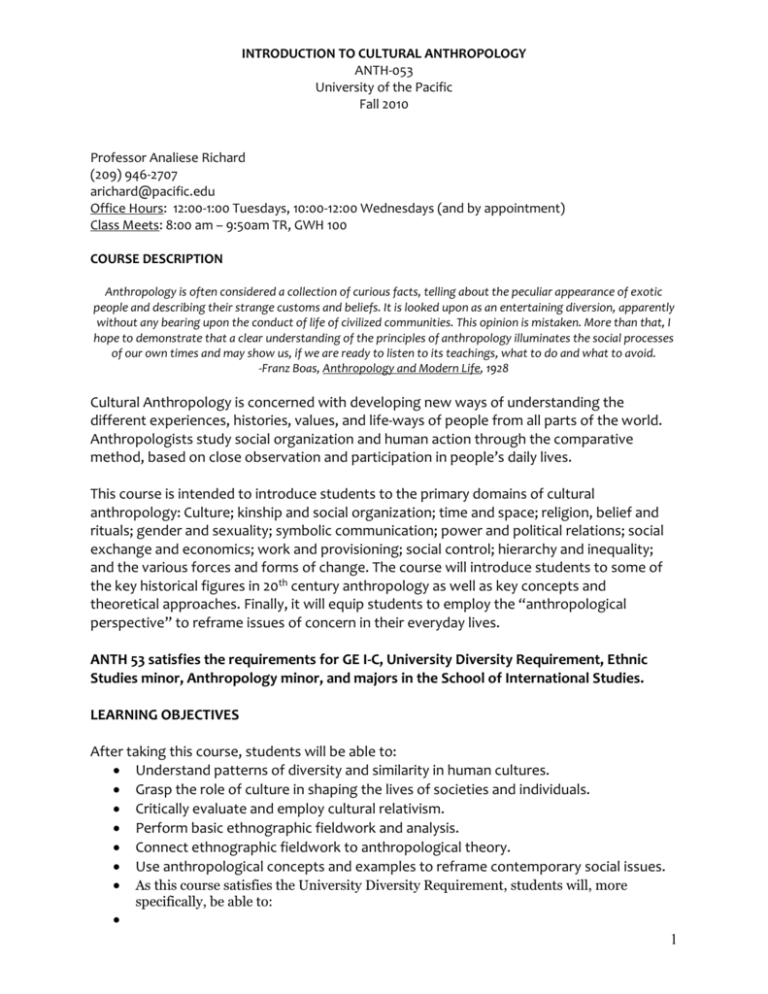
INTRODUCTION TO CULTURAL ANTHROPOLOGY ANTH-053 University of the Pacific Fall 2010 Professor Analiese Richard (209) 946-2707 arichard@pacific.edu Office Hours: 12:00-1:00 Tuesdays, 10:00-12:00 Wednesdays (and by appointment) Class Meets: 8:00 am – 9:50am TR, GWH 100 COURSE DESCRIPTION Anthropology is often considered a collection of curious facts, telling about the peculiar appearance of exotic people and describing their strange customs and beliefs. It is looked upon as an entertaining diversion, apparently without any bearing upon the conduct of life of civilized communities. This opinion is mistaken. More than that, I hope to demonstrate that a clear understanding of the principles of anthropology illuminates the social processes of our own times and may show us, if we are ready to listen to its teachings, what to do and what to avoid. -Franz Boas, Anthropology and Modern Life, 1928 Cultural Anthropology is concerned with developing new ways of understanding the different experiences, histories, values, and life-ways of people from all parts of the world. Anthropologists study social organization and human action through the comparative method, based on close observation and participation in people’s daily lives. This course is intended to introduce students to the primary domains of cultural anthropology: Culture; kinship and social organization; time and space; religion, belief and rituals; gender and sexuality; symbolic communication; power and political relations; social exchange and economics; work and provisioning; social control; hierarchy and inequality; and the various forces and forms of change. The course will introduce students to some of the key historical figures in 20th century anthropology as well as key concepts and theoretical approaches. Finally, it will equip students to employ the “anthropological perspective” to reframe issues of concern in their everyday lives. ANTH 53 satisfies the requirements for GE I-C, University Diversity Requirement, Ethnic Studies minor, Anthropology minor, and majors in the School of International Studies. LEARNING OBJECTIVES After taking this course, students will be able to: Understand patterns of diversity and similarity in human cultures. Grasp the role of culture in shaping the lives of societies and individuals. Critically evaluate and employ cultural relativism. Perform basic ethnographic fieldwork and analysis. Connect ethnographic fieldwork to anthropological theory. Use anthropological concepts and examples to reframe contemporary social issues. As this course satisfies the University Diversity Requirement, students will, more specifically, be able to: 1 • Articulate, in both written and oral forms, how notions of difference work within frameworks of social hierarchy and the similarities and differences between these frameworks cross-culturally. • Articulate their own developing understanding of social difference and its impact on anthropology, their own personal life and society or societies as a whole. • Express, in both written and oral forms, their understanding of how ideas and beliefs about diversity and difference in the United States have changed over time, identifying relevant historical movements and players, and how anthropology, as a discipline has both shaped and been shaped by these changes. • Demonstrate a satisfactory understanding of how social institutions and individuals respond to issues of difference. • Apply their understanding of relevant theory and history of diversity to a specific “societal problem” for the purpose of developing solutions. COURSE REQUIREMENTS Required Texts: David W. Haines, Cultural Anthropology: Adaptations, Structures, Meanings Elizabeth W. Fernea, Guests of the Sheik Roberto J. Gonzalez, Zapotec Science Additional readings will be posted on the course Sakai site. Please bring a copy of your readings and/ or reading notes to class on the day they are assigned. Exams: There will be two written exams in this course, a midterm and a final. The midterm exam (150 points) will cover the first half of the course material. The final exam (185 points) will cover the remainder of the course. All exams must be completed on the day scheduled. Should exceptional circumstances prevent this, it is YOUR responsibility to notify me IN ADVANCE to make appropriate arrangements. Mini-Ethnographies: Two mini-ethnographies will be assigned during the course of the semester. For each of these, students will perform fieldwork exercises and analyze their findings in a brief essay. Specific instructions will be provided for each of these ethnographies (125 points #1, 150 points #2). No late assignments will be accepted without a valid physician’s note, obituary notice, or official notification from the Athletic Department (or other campus office). Film Responses: We will watch several ethnographic films over the course of the semester. On the day of the class meeting immediately following each film, a 1 page written response to the film will be due ONLINE via Sakai (20 pts each). Film responses should summarize the main themes addressed in the film and explain how they connect to course materials. No late assignments will be accepted without a valid physician’s note, obituary notice, or official notification from the Athletic Department (or other campus office). Reading Quizzes: 2 Each week we will have one unannounced in-class reading quiz (15 points each) which will cover only the readings assigned for that day. The format of the quiz may include short answer, identification, fill in the blank, or matching questions. It will test basic comprehension necessary for participation in the day’s learning activities. At the end of the semester each student’s lowest quiz grade will be dropped. No make-up quizzes will be allowed without a valid physician’s note, obituary notice, or official notification from the Athletic Department (or other campus office). Attendance and Participation: Attendance and participation are mandatory as students tend to learn best in this class when they are actively engaged with the materials and with one another. Participation includes active involvement in class activities and discussions as well as coming to class thoroughly prepared. Unexcused absences, late arrivals, and early departures will result in a reduction of the final course grade. In-class work cannot be made up. Class participation will count for 10 % of the total course grade and will be assessed in terms of the following criteria: a) the student attends the entirety of each and every class; b) the student verbally contributes to general class discussions and activities; c) the student is an active participant in small group discussions and activities; d) the student contributes thoughtful comments that are relevant to the topics being addressed; e) the student’s participation indicates that they have read and thought about the assigned readings; f) all electronic devices are turned off and stowed away during class time. (No laptops. No texting. No kidding. If you are rude enough to use these in class, you will be asked to leave.) Method of Evaluation: Participation Exam #1 Exam #2 Mini-Ethnography #1 Mini-Ethnography #2 Film Responses Reading Quizzes 1000-990 A+ 989-935 A 934-900 A- 100 pts 150 pts 185 pts 125 pts 150 pts 4@ 20 pts 14@15 pts 899-880 B+ 879-835 B 834-800 B- 799-780 C+ 779-735 C 734-700 C- 699-680 D+ 679-735 D 634-600 D- (I reserve the right to make changes to these assignments and their weights based on your pedagogical needs.) Honor Code: The Pacific policy on academic honesty is detailed in Tiger Lore. Cheating and plagiarism are, of course, academically dishonest. Please be advised that the university gives professors discretion to punish academic dishonesty as we see fit. SIS has a zero-tolerance policy toward academic dishonesty. This means that we will automatically fail you for the assignment and/or entire the course if we have evidence that you have cheated. We will also report you to the Director of Judicial Affairs in the Office of Student Life for whatever additional punishment they choose to mete out. See Tiger Lore for details about the university’s proceedings and punishments. 3 You are encouraged to discuss your ideas with each other, but do your own work; turning in identical or nearly identical assignments is a violation of the Honor Code. It is plagiarism when: 1. You use more than four words in a row that are taken directly from another text of any sort without citing it as a direct quote. As a rule, direct quotes themselves should only be used sparingly; papers full of properly cited quotes are entirely honest, but bad writing. 2. You very closely paraphrase the work of others. Paraphrasing is NOT the same as using your own words. 3. You fail to properly cite the source of any idea you’ve gotten from another text or website. You must cite any idea, not just direct quotes, from other sources. The easiest way to avoid all potential problems is to read the material, think about it, then close all of your books and write. Keep track of where ideas are from by jotting notes to yourself (“I want to talk about Smith’s idea that…”). Then go back and cite everything properly: great idea you’ve just talked about (Smith 2002: 45). To do this properly, you have to think about time management. Read a couple of days before you have to write (so you have time to think). Write notes to yourself about what you think is important (or, if you are inclined, a real outline) and where you got the ideas. Often cheating takes place because someone doesn’t organize their time properly, feels up against a deadline, and makes a bad decision. It is easy to understand how this can happen, but I do not consider it an excuse. If you have any questions about what to do or not do, just ask. Resources for Students If you are entitled to learning accommodations, please see Daniel Nuss, Coordinator of the Office of Services for Students with Disabilities, in 101 Bannister Hall to obtain an Accommodations Request Letter. Once you have obtained that letter, we can work together to make appropriate arrangements. Please see your professor after class or in office hours. If you are feeling overwhelmed by your academic coursework, please see your professor in office hours for help with this course. Another important resource at your disposal is the Educational Resources Center in Bannister Hall, which provides tutoring services in a variety of subjects. You can contact them at 946-3218. If you’re having difficulty transitioning to college-level writing standards or styles, please visit the Student Writing Center located on the second floor of the Library. These tutors are specially trained to help you improve your performance and efficiency at just about any kind of writing task a Pacific professor can throw at you! Email them at erctutorial@pacific.edu or call 946-2437 to set up a private appointment. 4 If you are stressed out or experiencing personal problems, you should get in touch with the Counseling Center, located in Cowell Wellness Center. Call them at 946-2225 for practical help with stress management, personal relationships, and emotional health. 5 COURSE OUTLINE TOPICS DATES Week 1: The Anthropological Perspective Tuesday 8/24 Thursday 8/26 READINGS & ASSIGNMENTS DUE No assignments due Read: Haines Ch.1 *Boas ADAPTATIONS Week 2: Foraging Societies Week 3: Pastoralist Societies Week 4: Horticultural and Agricultural Societies Week 5: Industrial and Post-Industrial Societies Tuesday 8/31 Thursday 9/02 Tuesday 9/07 Thursday 9/09 Tuesday 9/14 Thursday 9/16 Tuesday 9/21 Thursday 9/23 Read: Haines Ch. 2 and 3 Film: !Nai Read: *Lee, *Sahlins Due on Sakai: Film Response #1 Read: Haines Ch. 6 Film Clip: The Nuer Reading: *Evans-Pritchard Read: Haines Ch. 4 and 5 Read: Gonzalez Ch. 1 excerpts (1-4, 13-31) and Ch. 2 Due in Class: Mini-Ethnography #1 Read: Gonzalez Ch. 4 and 5 (excerpts) Read: Haines, Ch. 7 Film: The Story of Stuff STRUCTURES Week 6: Social Organization Tuesday 9/28 Thursday 9/30 Week 7: Kinship: Households Week 8: Kinship: Alliance and Descent Tuesday 10/05 Thursday 10/07 Tuesday 10/12 Thursday 10/14 Due on Sakai: Film Response #2 Read: Gonzalez Ch. 8 Midterm Study Guide Available on Sakai Read: Haines Ch. 8 Guest Speaker: Ms. Joy Neas, Program Director University Neighborhood Renaissance Committee Research Team Meeting, Mini-Ethnography #2 Reading: Haines Ch. 9 Fernea, Introduction and Part 1 (Ch. 1-8) Exam #1 Read: Haines Ch. 10 Fernea, Part II (Ch. 9-14) Read: Fernea, Part III (Ch. 15-18) and Part IV (Ch. 15-20) 6 Week 9: Religion and Ritual Week 10: Economic Systems Week 11: Culture and Politics Week 12: Meaning and Place Week 13: Language and Culture Week 14: Interpreting Cultural Meaning Week 15: Anthropology in Action Tuesday 10/19 Thursday 10/21 Tuesday 10/26 Thursday 10/28 Tuesday 11/02 Thursday 11/04 Tuesday 11/09 Thursday 11/11 Tuesday 11/16 Thursday 11/18 Tuesday 11/22 Thursday 11/24 Tuesday 11/30 Thursday 12/02 Read: Fernea, Part V (Ch. 15-20) and Postscript *Fernea and Fernea Read: Haines Ch. 13 Film: El Sebou’ Read: Haines Ch. 11 Read: *Pun Film: China Blue Due on Sakai: Film Response #3 Read: Haines Ch. 12 Read: *Gibbs Research Workshop Read: Haines Ch. 14 and 15 *Hall Read: *Deener Research Workshop Read: Haines Ch. 16 Film: The Language You Cry In Due on Sakai: Film Response #4 Read: *Tannen Read: Haines, Ch. 17 Research Workshop THANKSGIVING HOLIDAY Read: Haines Ch. 18 *Bagish *Rosaldo Due in class: Mini-Ethnography #2 Research Conference FINAL EXAM: Thursday Dec. 9, 8:00-11:00 am 7





